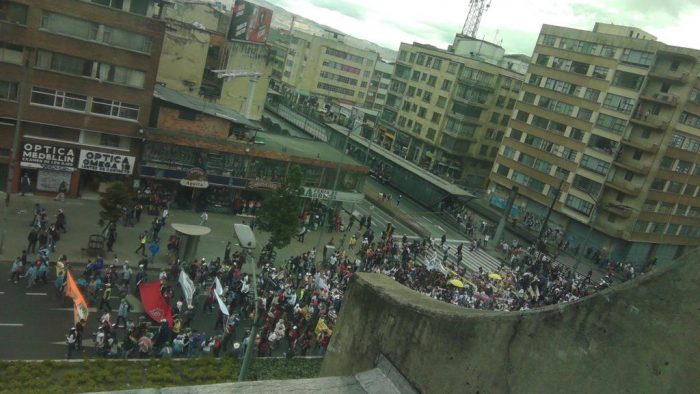Exactly a month ago, the Colombian Teachers Federation (FECODE), a union that represents teachers around the country, called for a national strike that is still ongoing. This past Tuesday, around 60,000 teachers marched to Plaza Bolívar in Bogotá, and many others around the country to reiterate that the national strike will continue.
From all over the country teachers have come to #Bogotá for the #ParoDeMaestros at Plaza de Bolivar pic.twitter.com/pOVXov2EkY
— The Bogota Post (@BogotaPost) June 6, 2017
President Juan Manuel Santos and Secretary Yaneth Giha of the Department of Education have not been able to find an agreement with the leaders of the union, leaving about eight million students from public schools across the country missing class for an entire month.
“The government has not been able to present an attractive plan that meets the requirements that our organization is asking for to better the conditions of our teachers” union president Carlos Rivas said at a June 7 press conference.
After declaring the strike on May 8, around 380,000 teachers around the country left the classrooms and took the streets of Bogotá to hold the first big march on May 16th.
Why are teachers striking? They say the government has not acted on promises to improve the salaries and health care of the teachers and to put more funds into the public schools’ infrastructure around Colombia.
#ParoDeMaestros #Bogota‘s Plaza de Bolivar filling up with teachers on strike demanding that the government fulfills promises pic.twitter.com/bYtsjkLOcV
— The Bogota Post (@BogotaPost) June 6, 2017
Santos responded to the national strike call, saying the government “cannot give you [teachers] what you are asking for, simply because there are no resources available.”
Since 2015, teachers and workers in the public schools have been demanding more attention by the government.
Teachers are asking for is a salary increase of 28% foe them and other workers in the schools, better quality of health care, less hours of work, as teachers say they do not get paid extra hours. Currently, they are working around 12 hours a day. They are also asking for more money to be spent on public schools’ infrastructure.
According to a report from RCN Noticias, union leaders say that at least 700,000 million pesos ($239,778) are needed to improve the conditions in schools. Teachers are concerned about the lack of classrooms and the high number of students—reaching sometimes 50 per classroom.
Duración del #ParoDeMaestros depende del gobierno @JuanManSantos. Nuestra pelea no es por salarios, es por la financiación de la educación
— Carlos Rivas Fecode (@CarlosRFecode) June 8, 2017
“Duration of strike depends on the government. Our fight is not for our salaries, it’s for the investment of education.”
After the last march and protests on June 6, Giha and Santos demanded teachers to return to the classrooms. They are concerned about children who have not been able to go back to class and finish their school year. “Teachers must go back to class in order to get their salary of the days and weeks they missed during the strike,” Santos said.
.@Mineducacion acaba de emitir directiva que establece que los maestros deberán reponer clases para recibir salario de días no trabajados.
— Juan Manuel Santos (@JuanManSantos) June 7, 2017
During his press conference, Rivas assured reported that schools will make up the classes students have missed in May.
Parents and families of students are concerned. The National Federation of Parents is considering suing the Department of Education and the union, FECODE, if they do not find an agreement soon. During an interview with a Colombian radio station, head of the organization, Carlos Ballesteros, expressed his concern as parents “can’t stand this situation anymore. If anything, the government has the duty to guarantee education to our kids.”
For now, FECODE’s social media will keep sending the message that teachers will continue to march and protest. Teachers, some students, their families and people from all over the world are using hashtags like #ParoDeMaestros or #AdelanteMiProfe to show support for the strike.
***
María Camila Montañez is a journalism student at CUNY Graduate School of Journalism’s Spanish-language program. She is originally from Colombia and tweets from @mariacmontanez.



